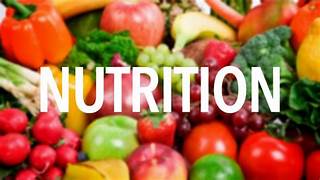Introduction
Nutrition is the process of providing or obtaining the food necessary for health and growth. It is important for everyone, regardless of age, gender, or lifestyle. A healthy diet can help you maintain a healthy weight, reduce your risk of chronic diseases, and improve your overall health and well-being.
The Basics of Nutrition
There are six essential nutrients that your body needs to function properly: carbohydrates, protein, fat, vitamins, minerals, and water.
- Carbohydrates are your body’s main source of energy. They are found in foods such as bread, pasta, rice, cereal, fruits, and vegetables.
- Protein is essential for building and repairing tissues. It is found in foods such as meat, poultry, fish, eggs, dairy products, and beans.
- Fat is a concentrated source of energy. It is also essential for absorbing vitamins A, D, E, and K. Fat is found in foods such as meat, poultry, fish, dairy products, nuts, and seeds.
- Vitamins are essential for many bodily functions, including metabolism, growth, and development. They are found in fruits, vegetables, whole grains, and dairy products.
- Minerals are essential for many bodily functions, including bone health, blood clotting, and nerve function. They are found in fruits, vegetables, whole grains, and dairy products.
- Water is essential for all bodily functions. It helps to regulate body temperature, remove waste products, and transport nutrients throughout the body.
The Importance of a Balanced Diet
A balanced diet is one that provides all of the essential nutrients in the right amounts. It is important to eat a variety of foods from all food groups to ensure that you are getting all of the nutrients that your body needs.
The Benefits of a Healthy Diet
A healthy diet can help you to:
- Maintain a healthy weight
- Reduce your risk of chronic diseases such as heart disease, stroke, type 2 diabetes, and some types of cancer
- Improve your mood and energy levels
- Boost your immune system
- Improve your overall health and well-being
Tips for Eating a Healthy Diet
Here are some tips for eating a healthy diet:
- Eat plenty of fruits and vegetables.
- Choose whole grains over refined grains.
- Choose lean protein sources such as fish, poultry, beans, and lentils.
- Limit your intake of saturated and unhealthy fats.
- Limit your intake of added sugar.
- Drink plenty of water.
Making Healthy Changes
If you are not used to eating a healthy diet, it may take some time to make changes. Here are some tips for making healthy changes:
- Start slowly. Make one or two changes at a time and gradually increase the number of changes you make.
- Make changes that are realistic and sustainable for you.
- Find ways to make healthy eating enjoyable.
- Get support from friends, family, or a registered dietitian.
Conclusion
Nutrition is an important part of overall health and well-being. By eating a healthy diet, you can reduce your risk of chronic diseases, improve your mood and energy levels, and boost your immune system. If you are not used to eating a healthy diet, start slowly and make changes that are realistic and sustainable for you. With a little effort, you can make healthy eating a part of your lifestyle.















